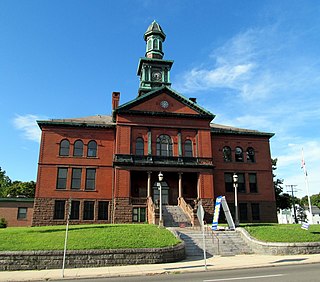
Windham County is one of the eight historical counties in the U.S. state of Connecticut, located in its northeastern corner. As of the 2020 census, the population was 116,418, making it the least populous county in Connecticut. It forms the core of the region known as the Quiet Corner. Windham County is included in the Worcester, MA-CT Metropolitan Statistical Area, which is also included in the Boston-Worcester-Providence, MA-RI-NH-CT Combined Statistical Area. The entire county is within the Quinebaug and Shetucket Rivers Valley National Heritage Corridor, as designated by the National Park Service.
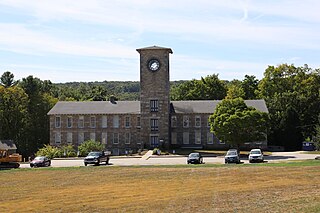
Mansfield is a town in Tolland County, Connecticut, United States. The town is part of the Capitol Planning Region. The population was 25,892 at the 2020 census.

Willington is a town in Tolland County, Connecticut, United States. The town is part of the Capitol Planning Region. The population was 5,566 at the 2020 census.
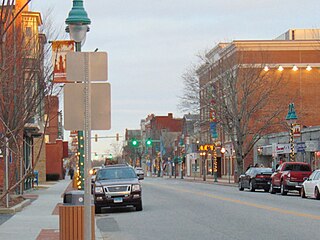
Willimantic is a census-designated place located in Windham, Connecticut, United States. Previously organized as a city and later as a borough, Willimantic is currently one of two tax districts within the Town of Windham. Willimantic is located within Windham County and the Southeastern Connecticut Planning Region. Known as "Thread City" for the American Thread Company's mills along the Willimantic River, it was a center of the textile industry in the 19th century. Originally incorporated as a city in 1893, it entered a period of decline after the Second World War, culminating in the mill's closure and the city's reabsorption into the town of Windham in the 1980s.
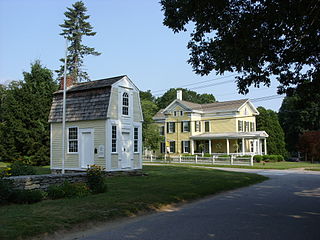
Windham is a town in Windham County, Connecticut, United States. It contains the former city of Willimantic as well as the communities of Windham Center, North Windham, and South Windham. Willimantic, an incorporated city since 1893, was consolidated with the town in 1983. The town is part of the Southeastern Connecticut Planning Region. The population was 24,428 at the 2020 census.

The Willimantic River is a tributary of the Shetucket River, approximately 25 miles (40 km) long in northeastern Connecticut in the New England region of the United States.

The Windham Textile and History Museum is a museum in Willimantic, Connecticut, in the New England region of the United States. It is currently located in Main St.

Connecticut Route 14 is one of several secondary routes from eastern Connecticut into Rhode Island. It runs from the Willimantic section of the town of Windham to the Rhode Island state line in Sterling.

Air Line State Park Trail is a rail trail and linear state park located in Connecticut. The trail is divided into sections designated South, North a piece of the East Coast Greenway, and the Thompson addition. An additional 3.6-mile spur to Colchester is sometimes designated as part of the Air Line trail. At the Massachusetts state line, the trail connects to the Southern New England Trunkline Trail, a 22-mile-long trail to Franklin, MA built on the same right-of-way. Since 2018, the town of Portland, Connecticut has also maintained a 2.3-mile portion of the Air Line trail, connecting to the southern end of the state park at the town line with East Hampton.

Hop River State Park Trail is a Connecticut rail trail that winds for 20.8 miles (33.5 km) eastward from Colonial Drive in the town of Manchester to the Air Line State Park Trail S. in the town of Windham. The trail parallels the Hop River for much of its length. It is owned and operated by the Connecticut Department of Energy and Environmental Protection, with upgrades and maintenance done by town forces and community volunteer groups in coordination with the state. The trail is used for hiking, biking, horseback riding, and cross-country skiing.

Route 203 is a state highway in eastern Connecticut, running entirely within the town of Windham.

Route 195 is a state highway in northeastern Connecticut, running from the Willimantic section of Windham to the town center of Tolland via Storrs and Mansfield Center. The road is the main thoroughfare to access the main campus of the University of Connecticut.
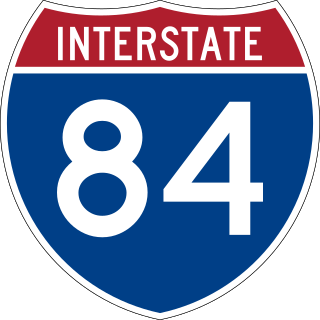
Interstate 84 (I-84) is an east–west Interstate Highway across the state of Connecticut through Danbury, Waterbury, Hartford, and Union.
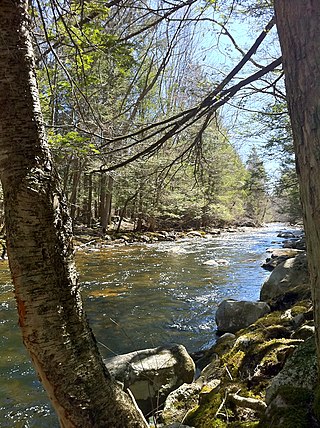
The Natchaug River is a 17.9-mile-long (28.8 km) river in Windham and Tolland Counties in northeastern Connecticut. The name Natchaug comes from the Nipmuc language and is believed to mean land between rivers.

Natchaug Elementary School is a public elementary school in Willimantic, Connecticut, United States. The school opened in 1865 at the junction of Milk Street and Jackson Street, in downtown Willimantic. It is part of the Windham Public School system and one of four elementary schools and a K-8 STEM magnet school. Natchaug is accredited by the New England Association of Schools and Colleges. The name Natchaug comes from the Nipmuc word meaning "land between the rivers." The school colors are bright green and blue.
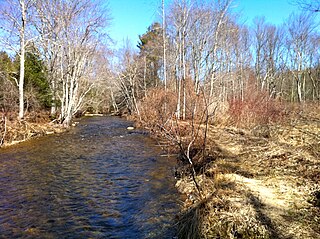
The Fenton River runs through Mansfield, Storrs, and Willington, as well as small parts of Windham, all but the latter in Tolland County, Connecticut spanning 18.895 miles. It feeds into Mansfield Hollow reservoir at its end, making it a tributary to the Mount Hope, Natchaug, and Willimantic rivers. The Fenton River is fed by several smaller brooks, streams, and creeks.
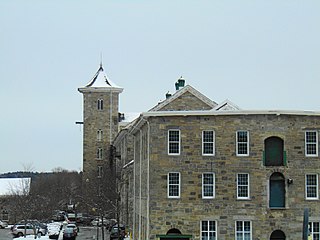
The Jillson Mills is a mill complex in Willimantic, Connecticut. The mills produced cotton thread throughout the lifespan of the operation of the mill.

The Windham Town Hall is a town hall in Willimantic, Windham, Connecticut, United States.

Jillson Square Park is park located in Willimantic, Connecticut. It holds the William Jillson Stone House on its area, and is home to the Willimantic Carnival. The park was created after the Windham Historical Society bought the property in 1972, and gave the area to the Town of Windham Recreation Department for park development. The park was the former land of William Jillson, the creator of the Jillson Mills nearby. The Air Line Trail starts less than 200 feet (61 m) away from here.

The Battle of the Frogs was a frog-related incident in the Connecticut Colony town of Windham in 1754.























